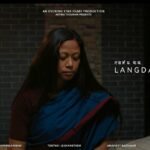“Call me heartless. Call me inhumane. But the truth is—I’ve felt every bit of your love deep inside. My life is stuck between what’s good and what’s not, and I’m barely holding on. No one sees the chaos inside me but me. This life—like a disease with no cure—still hopes for a light. No matter how much I apologise, until I find that light to climb out of this dark abyss, I won’t make it. I don’t know what my future holds, but this stubborn heart carries a promise—a promise to repay your love and kindness.”
These words arrive as voiceover during the final moments of SPACED OUT – Panthung Di Kadaaida!, over the image of a boy failing to hold himself together.
Panthoi Sagolsem (Priyakanta Laishram), the protagonist, sits just outside his home, barefoot, leaning against a weather-worn wall, trying to eat lunch. His fingers tremble as he lifts morsels of food to his mouth. His breathing grows heavier. Grief begins to choke the body before the tears arrive. And then, everything gives way. His plate falls. The food scatters. His back slides down the wall until he’s curled on the ground—crying, shaking, broken.
His sister, Leima (Bhani Khamnam), kneels behind him—not speaking, not intervening, just watching. Her face is caught between shock and helpless sorrow. She doesn’t try to hold him. She doesn’t have to. Her silent tears are enough. Her stillness becomes a mirror to how grief often renders us wordless.
This is how SPACED OUT – Panthung Di Kadaaida!, the 2021 Manipuri non-feature fiction film by Priyakanta Laishram, chooses to end. Not with redemption, but with ruin. Not with answers, but with observation. And in doing so, it separates itself from the familiar vocabulary of films on addiction—opting instead for a language of emotional stillness, haunted memory, and broken time.
The film opens with Panthoi narrating the memory of his early childhood—how he grew up with his sister and was raised by their father after their mother’s death when he was only four. He was once a sweet, brilliant child, full of potential, and his family had placed their hopes on him. But slowly, without drama or warning, that narrative crumbles. Introduced to drugs by his friend Ngaanba (Sachinker Sagolsem), Panthoi’s life begins to drift. At first, it’s subtle—an experiment, a shared thrill. But soon, it becomes routine, then dependence, then identity.
Ngaanba, too, is a victim of the same trap, and eventually dies of an overdose. The film doesn’t sensationalize his death—it doesn’t need to. The loss speaks for itself. It leaves behind silence, not spectacle. And that’s the film’s recurring choice: not to magnify tragedy, but to hold space for it.
As Panthoi’s addiction deepens, he begins to lose everything—his family, his sense of self, and those who once held him closest. The film’s narrative moves back and forth between the past and present, mimicking the disjointed rhythm of memory, trauma, and relapse. We see glimpses of him in and out of rehabilitation centres, always returning to the same spot: regret. There’s a quiet ache to the way the story unfolds. Even when he wants to recover, the world he once belonged to feels just out of reach.
Two central relationships deepen the emotional texture of the film. One is with Leima, his sister, played by Bhani Khamnam. Her heartbreak is never melodramatic. She loves him deeply, but has learned to stop expecting miracles. The weariness in her silence says more than words can. She is the person who stays, even when there’s nothing left to give.
The other is Lanchenba (Biswajit Saikia), Panthoi’s childhood friend—a symbol of what love without judgment looks like. When Panthoi first descends into addiction, he ignores Lanchenba completely. But Lanchenba doesn’t retaliate. He steps back quietly, hurt but not bitter. And when Panthoi eventually returns—uncertain, ashamed—Lanchenba chooses, once again, to stand beside him. There’s a stillness to their renewed friendship that feels honest. The kind of loyalty that exists outside of conditions.
And then there is Laaija (Ithoi Oinam), Panthoi’s former lover. Her portrayal brings another emotional dimension—the strength to walk away. Laaija is someone who tried to help for years, who stayed longer than most would have, but who finally had to let go to protect herself. When Panthoi comes back into her life, she receives him with care. She sets a boundary—not out of cruelty, but survival. Her character challenges the idea that love must mean sacrifice. Sometimes, it means drawing the line.
It is also one of the most mature and layered performances by Ithoi Oinam—measured, dignified, and emotionally honest.
This network of relationships—Leima, Laaija, Lanchenba—is what forms the emotional backbone of SPACED OUT – Panthung Di Kadaaida!. Each person reflects a different form of love: familial, romantic, platonic. And each one has limits. The film never shames those limits. Instead, it honours them. It says: love cannot save someone who doesn’t want to be saved. But love can wait, love can listen, love can choose not to abandon.
By choosing this path, Priyakanta Laishram’s film refuses the redemptive clichés so often attached to stories of substance abuse. What makes SPACED OUT – Panthung Di Kadaaida! linger is that it does not offer a clean ending. By the time the film concludes, Panthoi is sober—but just barely. He is no longer using, but he is not at peace. He is still living with the consequences. With grief. With guilt. With the knowledge that some people—like Ngaanba—never made it. And some—like Laaija—moved on. His sobriety is not shown as a victory, but as a daily act of survival.
In his final monologue, Panthoi promises to repay the love he was given. But the film wisely leaves this unresolved. Will he succeed? Will he relapse again? We don’t know. What we are left with is not certainty, but possibility. And that, in many ways, feels more human.
Technically, the film is understated and grounded. Jackson Naoroibam’s cinematography leans into the natural textures of Manipuri spaces—weathered walls, soft light, open emptiness—and lets the performances breathe. The music, by Whitesand Music, Amal Raj, and Sorri Senjam, is never overbearing, allowing emotion to emerge from silence as much as from score. The film is written, edited, and directed by Priyakanta Laishram, and produced by Caroline Laishram under the banner of Priyakanta Productions.
With a cast anchored by Priyakanta Laishram and featuring Ithoi Oinam, Sachinker Sagolsem, Biswajit Saikia, Bhani Khamnam, Harendra Laishram, Ramva Leishangthem, and Diana Vaiphei, the film premiered on YouTube on 1st June 2021 via Laishram’s official channel. Produced by Caroline Laishram under Priyakanta Productions, it achieved notable success—amassing over five lakh views within 48 hours of release, a record-setting milestone for cinema from Northeast India.
The film’s impact was also recognised on the festival circuit. At the Human Rights & Social Issues Film Festival 2019 in Tokyo, Priyakanta Laishram received the Best Actor in a Leading Role award, while Sachinker Sagolsem and Bhani Khamnam earned nominations for Best Supporting Actor (Male and Female). At the Short & Non-Feature Motion Pictures Wave Festival 2020–2021 in Delhi, Laishram won Best Actor in Drama and Best Screenplay, and received a nomination for Best Picture in Other Social Issues.
Additionally, the film is scheduled for a special screening across Punjab and Chandigarh on 26 June 2025 at 10 different venues, in its Punjabi and English subtitled versions, as part of the observance of the International Day Against Drug Abuse and Illicit Trafficking—further highlighting its cultural relevance and resonance beyond the region where it originated.
Priyakanta Laishram’s direction is sensitive, precise, and deeply empathetic. SPACED OUT – Panthung Di Kadaaida! does not preach, pity, or promise—it simply witnesses. And in doing so, it allows us to witness too. A young boy, caught between guilt and grace. A community, scarred but still hoping. A journey, painful and incomplete.
And sometimes, that’s more powerful than a happy ending.
Rinku Angom is a budding film researcher and critic from Manipur with a background in Public Relations and Advertising. Passionate about regional and independent cinema, he explores the cultural, social, and political narratives in Manipuri films, bringing a nuanced voice to emerging film criticism.

